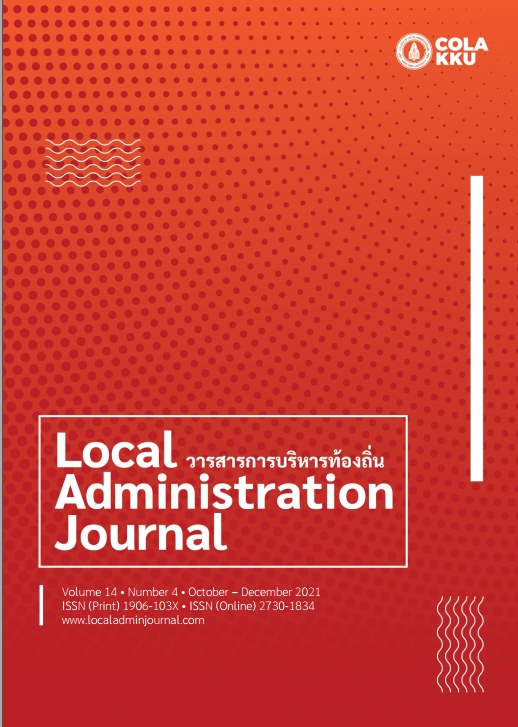The Influence of Branch Managers’ Servant Leadership on Banks’ Constructive Organization Culture and Effectiveness
DOI:
https://doi.org/10.1234/laj.v14i4.254381Keywords:
servant leadership, constructive organization culture, effectivenessAbstract
The objective of this research was to examine the influence of servant leadership of the branch managers on banks’ constructive organization culture and effectiveness as perceived by employees of the southern branches of the Bank for Agriculture and Agricultural Cooperative (BAAC). The sample was composed of 413 BAAC employees. The stratified proportional sampling method was applied to sample. Research instruments was a questionnaire with a 5-point rating scale. Statistical technique was Multilevel Structural Equation Modeling (SEM). The research results showed that the model was consistent with the empirical data with goodness of fit measures of: c2/df = 1.847; RMSEA = 0.045; CFI = 0.99; SRMR = 0.037; AGFI = 0.92. It was found that the servant leadership had a positive and direct influence on constructive organization culture. It was also found that servant leadership had a positive and direct influence on the effectiveness of BAAC. Thus, BAAC managers should give importance to servant leadership for enhancing the service quality, consequently increasing the BAAC performance in accordance with the Thailand 4.0 model.
References
เอกสารอ้างอิง
ภาษาไทย
ธนาคารเพื่อการเกษตรและสหกรณ์การเกษตร. (2561). การพัฒนาอย่างยั่งยืนของ ธ.ก.ส.. สืบค้นจาก https://www.baac.or.th/csr2016/?p=573
ธรณิศ เล็กขาว และอรุษ คงรุ่งโชค. (2564). ประสิทธิผลของการจัดการหนี้สินโดยการให้สินเชื่อผ่านโครงการธนาคารประชาชนในจังหวัดสุราษฎร์ธานี. (การค้นคว้าอิสระ) บัณฑิตวิทยาลัย, มหาวิทยาลัยราชภัฏ สุราษฎร์ธานี.
บุญช่วย ศิริเกษ. (2560). การศึกษาวัฒนธรรมองค์การแบบสร้างสรรค์กับการเป็นองค์กรแห่งการเรียนรู้ในมหาวิทยาลัยมหามกุฏราชวิทยาลัย วิทยาเขตศรีล้านช้าง. วารสารสมาคมนักวิจัย, 22(2), 65–80.
ผลิน ภู่จรูญ. (2554). การจัดการธุรกิจร่วมสมัย: กรอบแนวคิดใหม่ทางการจัดการในการสร้างและพัฒนาพลวัตในการแข่งขัน. กรุงเทพฯ: เอกพิมพ์ไทย.
พีรญา ชื่นวงศ์ และวิชิต อู่อ้น. (2559). การวิเคราะห์ปัจจัยภายในองค์กรที่ส่งผลต่อประสิทธิผลองค์กรของธนาคารพาณิชย์ในประเทศไทย. วารสารสังคมศาสตร์วิชาการ, 20(1), 1 – 14.
รพีพร ทรงทอง. (2561). ภาวะผู้นำและวัฒนธรรมองค์การที่ส่งผลต่อการพัฒนาท้องถิ่น. วารสารวิจัยและพัฒนามหาวิทยาลัยราชภัฏเลย, 13(45), 103 – 114.
วรางคณา กาญจนพาที และเนตร์พัณณา ยาวิราช. (2557). ภาวะผู้นำและภาวะผู้ตามที่มีอิทธิพลต่อประสิทธิภาพองค์กร กรณีศึกษา: ธนาคารเพื่อการส่งออกและนำเข้าแห่งประเทศไทย. วารสารวิชาการคณะบริหารธุรกิจ, 9(2), 59 – 68.
สุภัตรา กันพร้อม ไชยนันท์ ปัญญาศิริ และดุษฎี สีวังคำ. (2561). ประสิทธิผลการจัดการระบบสารสนเทศของธนาคารอิสลามแห่งประเทศไทย. วารสารดุษฎีบัณฑิตทางสังคมศาสตร์, 8(2), 16 – 27.
ภาษาอังกฤษ
Coetzer, F. M., Bussin, H. R., & Geldenhuys, M. (2017). Servant leadership and work-related well-being in a construction company. SA Journal of Industrial Psychology. 43(1), 1 – 10.
Cooke, R. A. & Lafferty, J. C. (2003). Organizational culture inventory, human synergistics. Plymouth, MI.
Cooper, D. R., Schindler, P. S. & Sun, J. (2006). Business research methods (9th ed.). New York: Mcgaw-Hill.
Daft, R. L. (2015). Organization theory and design (12th ed). Cincinnati: South-western.
Gibson,J. L., Ivancevich, J. M., Donnelly, J. H., Jr., & Konopaske, R. (2012). Organizations: Behavior, structure, processes (14th ed.). New York: McGraw-Hill.
Greenberg, J., & Baron, R. A. (2008). Behavior in organizations. Upper Saddle River, New Jersey: Prentice Hall.
Greenleaf, R. K. (2003). The servant - leader within: A transformative path. New York: Paulist Press.
Harwiki, W. (2013). The influence of servant leadership on organization culture, organization commitment, organization citizen behavior and employee’s performance (study of outstanding cooperative in East Java province, Indonesia). Journal of Business and Management, 8(5), 50 – 58.
Hoy, W. K., & Miskel, C. G. (2013). Educational administration theory, research, and practice (9th ed.). New York: McGraw-Hill.
Kline, R. B. (2016). Principles and practice of structural equation modeling (4th ed.). New York: The Guilford Press.
Laub, J. A. (2004). Defining servant leadership: A recommended typology for servant._Proceedings2004laub_defining_servantpdf. [Online] Available form: http://www.regent.edu/acad/global/publications/sl.University_final.pdf. [2019, October 5].
Marsh, H. W., Balla, J. R., & McDonald, R. P. (1988). Goodness-of-fit indexes in confirmatory factor analysis: The effect of sample size. Psychological Bulletin, 103(3), 391
Mbabazize, P. M., Mucunguzi, A., & Daniel, T. (2014). The importance of building organizational cultures for effective management of people and organizations: A case study of Bushenyi Local Government in Uganda. Research Journal of Sociology, 2(3), 1-12.
Nordbye, C. V. & Irving, A. J. (2017). Servant leadership and organizational effectiveness: Examining leadership culture among millennials within a US National Campus Ministry, Servant Leadership: Theory & Practice, 4(1), 53-74.
Podsakoff, P. N. (2003). Common method biases in behavioral research: A critical review of literature and recommended remedies. Journal of Applied Psychology, 88(5), 879 – 903.
Sadia, R. (2016). The relationship between employee health, quality culture and organizational effectiveness: Findings from the literature. Design & Nature and Ecodynamics, 11(1), 1–9.
Sun, Y. (2016). Does servant leadership inspire personnel’s innovation performance: Performance control as a moderator. International Journal of Business Administration. 7(2), 86 - 91.
Vondey, M. (2010). The relationships among servant leadership, organizational citizenship behavior, person- organizational fit and organizational identification. International Journal Leadership Studies, 6(1), 4 – 22.
Yukl, G. A. (2012). Leadership in organizations (8th ed.). New Jersey: Prentice-Hall.
Zehir, C., Akyuz, B., Eren, S. M. & Turhan, G. (2013). The indirect effects of servant leadership behavior on organizational citizenship behavior and job performance: Organizational justice as a mediator. International Journal of Research in Business and Social Science, 2(3), 1 – 13.
Translated References
Bank for Agriculture and Agricultural Cooperative. (2018). Sustainable development of BAAC. Retrieved from https://www.baac.or.th/csr2016/?p=5731 [2019, October, 1] (In Thai)
Cheunwong , P. & Uon, V. (2014). An analysis of internal organization factors affecting organization effectiveness of commercial bank in Thailand. Journal of Social Academic, 20(1), 1 – 14.
(In Thai)
Kanjapatee, V. & Yaviraj. N. (2014). The effect of leadership style and followership characteristics to organizational efficiency: Case study of Export Import Bank of Thailand. RMUTT Global Business and Economics Review, 9(2), 59 – 68. (In Thai)
Kanprom, S., Panyasiri, C. & Seewungkum, D. (2018). Effectiveness of information system management of the Islamic Bank of Thailand. Ph.D. in Social Sciences Journal, 8(2), 16 – 27. (In Thai)
Poojaroon, P. (2011). Contemporary business management: A new management framework for creating and developing competitive dynamics. Bangkok: Ekpimthai. (In Thai)
Sirikase, B. (2017). A Study of constructive organizational culture and learning organization in Mahamakut Buddhist University, Srilanchang Campus. Journal of the Association of Researchers, 22(2), 65 – 80. (In Thai)
Trongthong, R. (2018). The leadership and organization culture affecting local development. Research and Development Journal, Loei Rajaphat Suratthani University, 13(45),103 – 114. (In Thai)
Downloads
Published
Versions
- 2022-02-28 (2)
- 2021-12-30 (1)
How to Cite
Issue
Section
License
The copyright of all articles published in the Local Administration Journalis owned by the College of Local Administration, Khon Kaen University.


